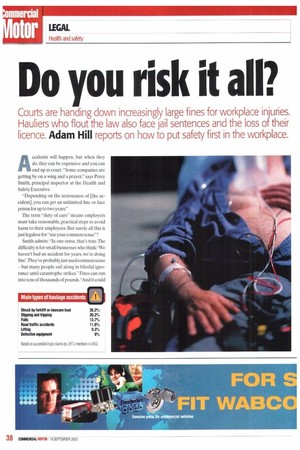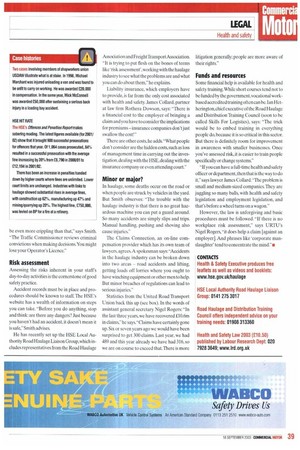Do you risk it a
Page 38

Page 39

If you've noticed an error in this article please click here to report it so we can fix it.
Courts are handing down increasingly large fines for workplace injuries. Hauliers who flout the law also face jail sentences and the loss of their
licence. Adam Hill reports on how to put safety first in the workplace.
Accidents will happen, but when they do, they can be expensive and you can end up in court. "Some companies are getting by on a wing and a prayer," says Percy Smith, principal inspector at the Health and Safety Executive.
-Depending on the seriousness of [the accident], you can get an unlimited fine or face prison for up to two years."
The term "duty of care" means employers must take reasonable, practical steps to avoid harm to their employees. But surely all this is just legalese for "use your common sense"?
Smith admits: "In one sense, that's true. The difficulty is for small businesses who think: 'We haven't had an accident for years, we're doing fine'.They've probably just used common sense — but many people sail along in blissful ignorance until catastrophe strikes." Fines can run into tens of thousands of pounds. "And it could be even more crippling than that," says Smith. "The Traffic Commissioner reviews criminal convictions when making decisions You might lose your Operator's Licence."
Risk assessment
Assessing the risks inherent in your staffs day-to-day activities is the cornerstone of good safety practice.
Accident records must be in place and procedures should be known to staff The HSE's website has a wealth of information on steps you can take. -Before you do anything, stop and think: are there any dangers? Just because you haven't had an accident, it doesn't mean it is safe," Smith advises.
He has recently set up the HSE Local Authority Road Haulage Liaison Group,which includes representatives from the Road Haulage Association and Freight Transport Association. "It is trying to put flesh on the bones of terms like 'risk assessmenf.working with the haulage industry to see what the problems are and what you can do about them." he explains.
Liability insurance, which employers have to provide, is far from the only cost associated with health and safety. James Collard, partner at law firm Rothera Dowson, says: "There is a financial cost to the employer of bringing a claim and you have to consider the implications for premiums — insurance companies don't just swallow the cost!"
There are other costs, he adds. "What people don't consider are the hidden costs, such as loss of management time in carrying out the investigation, dealing with the HSE, dealing with the insurance company or even attending court."
Minor or major?
In haulage, some deaths occur on the road or when people are struck by vehicles in the yard. But Smith observes: -The trouble with the haulage industry is that there is no great hazardous machine you can put a guard around. So many accidents are simply slips and trips. Manual handling, pushing and shoving also cause injuries."
The Claims Connection, an on-line compensation provider which has its own team of lawyers, agrees. A spokesman says: "Accidents in the haulage industry can be broken down into two areas — road accidents and lifting, getting loads off lorries where you ought to have winching equipment or other men to help. But minor breaches of regulations can lead to serious injuries."
Statistics from the United Road Transport Union back this up (see box). In the words of assistant general secretary Nigel Rogers: "In the last three years, we have recovered £10.6m in claims," he says."Claims have certainly gone up. Six or seven years ago we would have been surprised to get 300 claims. Last year, we had 489 and this year already we have had 316, so we are on course to exceed that. There is more litigation generally; people are more aware of their rights."
Funds and resources Some financial help is available for health and safety training. While short courses tend not to be funded by the government, vocational workbased accredited training often can be. Ian He therington,chief executive of the Road Haulage and Distribution Training Council (soon to be called Skills For Logistics), says: "The trick would be to embed training in everything people do, because it is so critical in this sector. But there is definitely room for improvement in awareness with smaller businesses. Once you've assessed risk, it is easier to train people specifically or change systems.
"If you can have a full-time health and safety officer or department,then that is the way to do it," says lawyer James Collard. "The problem is small and medium-sized companies. They are juggling so many balls, with health and safety legislation and employment legislation, and that's before a wheel turns on a wagon."
However, the law is unforgiving and basic procedures must be followed. "If there is no workplace risk assessment," says URTU's Nigel Rogers, "it does help a claim [against an employer]. And phrases like 'corporate manslaughter' tend to concentrate the mind."




























































































































































































